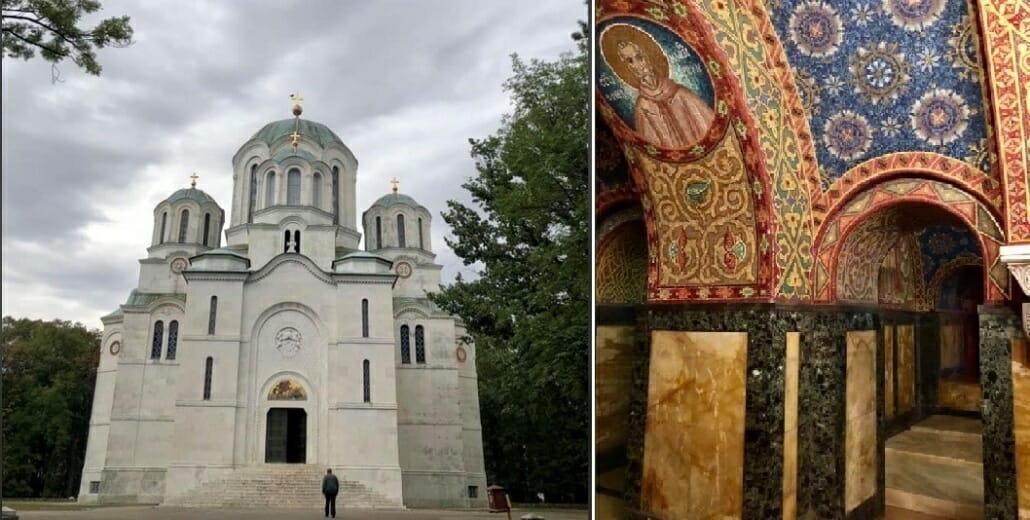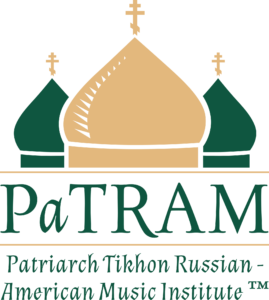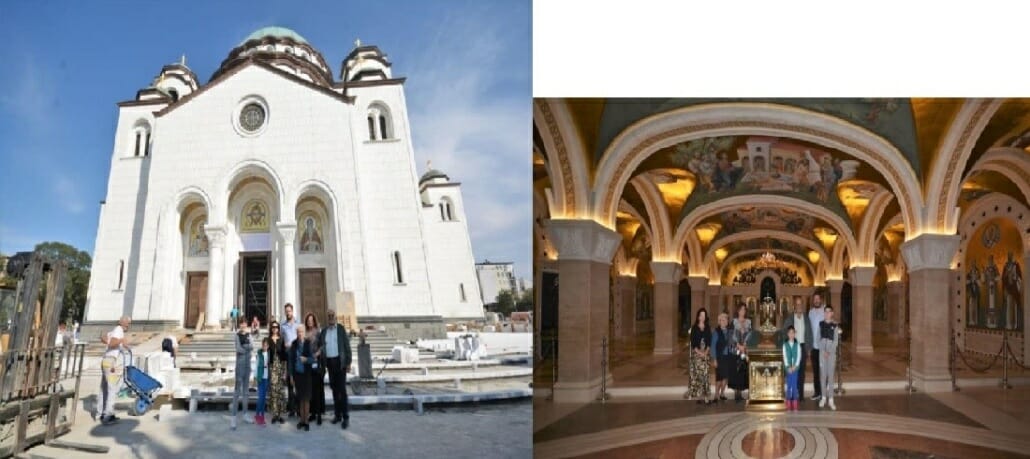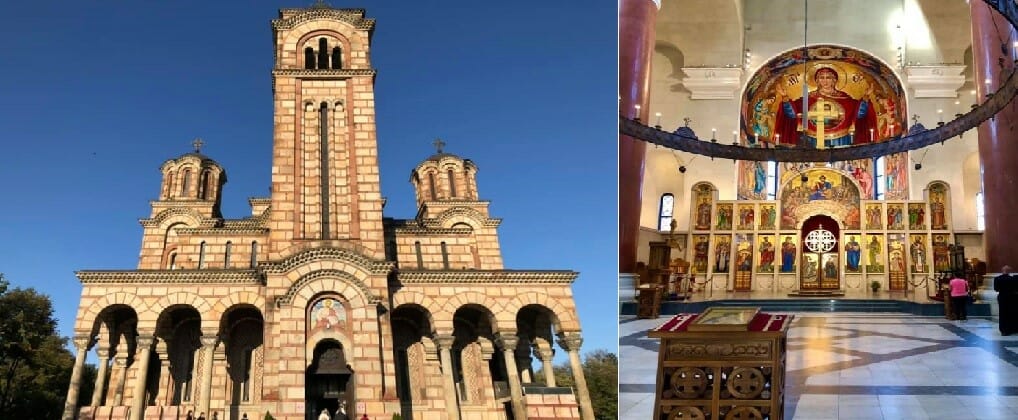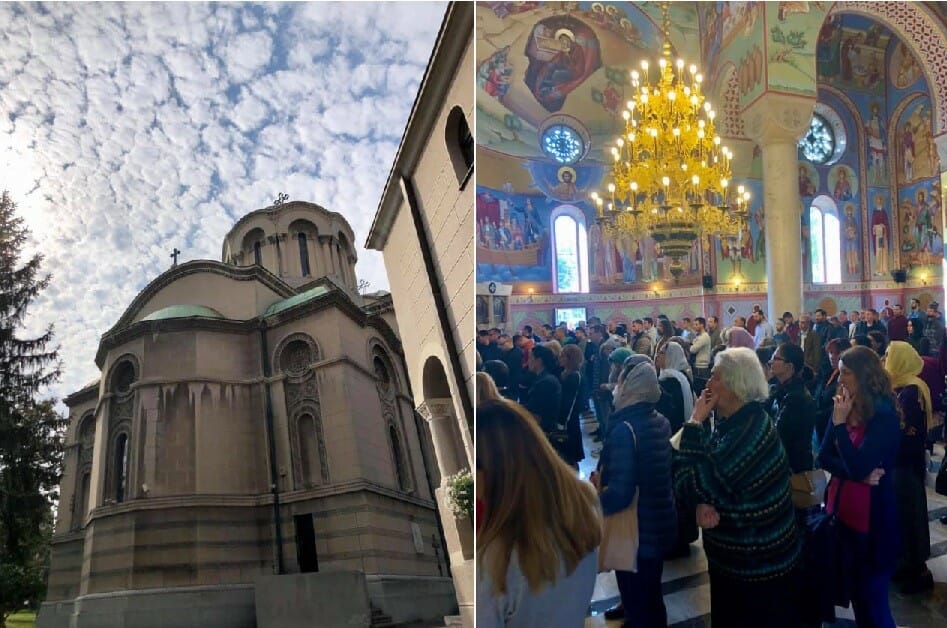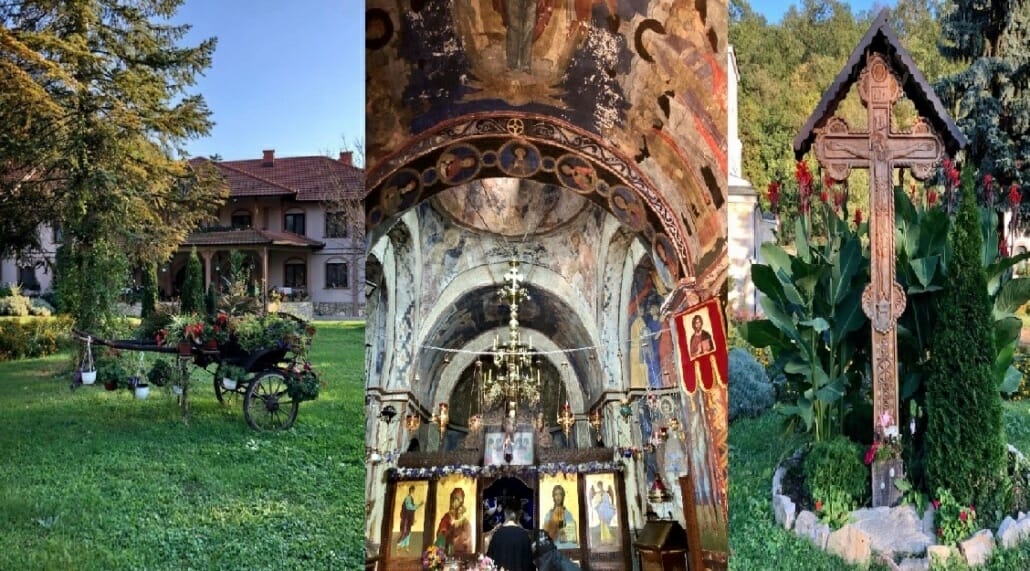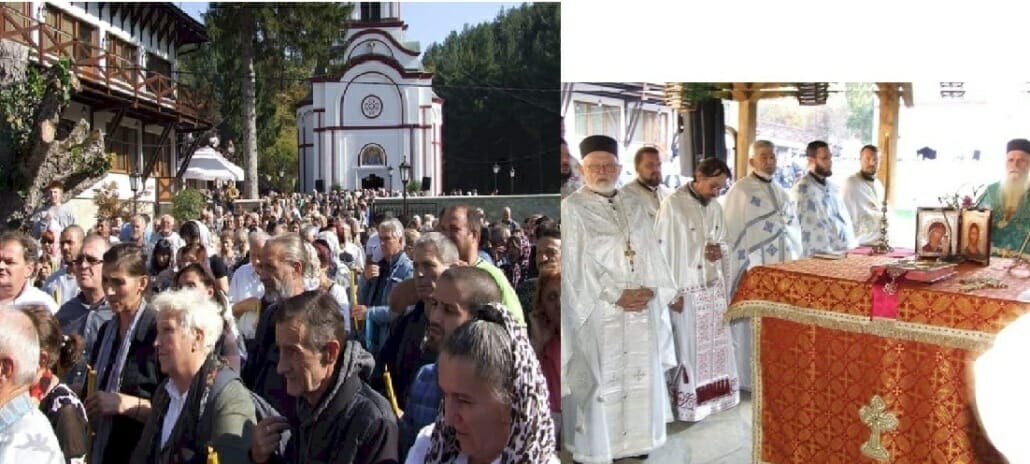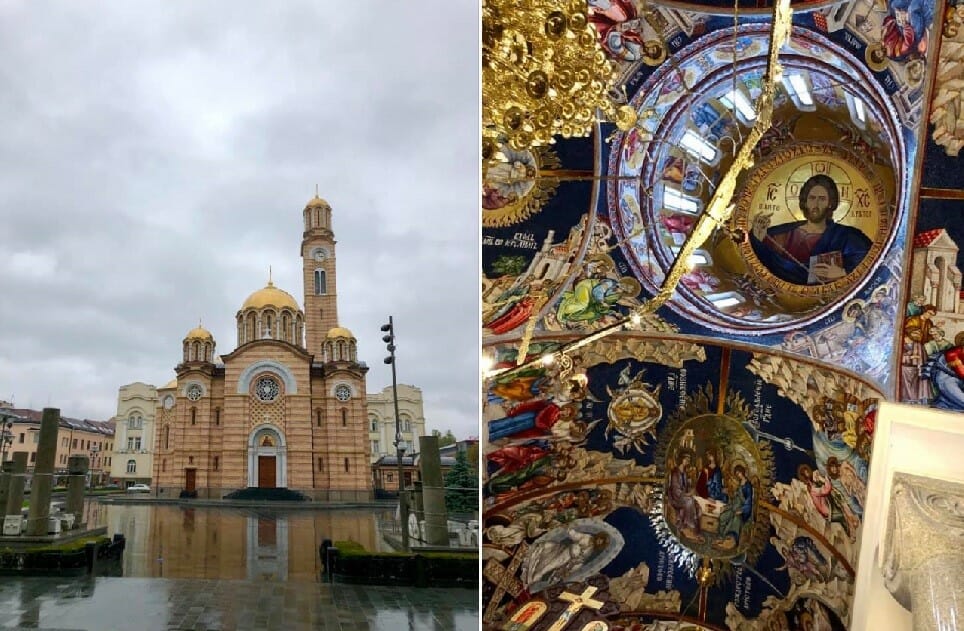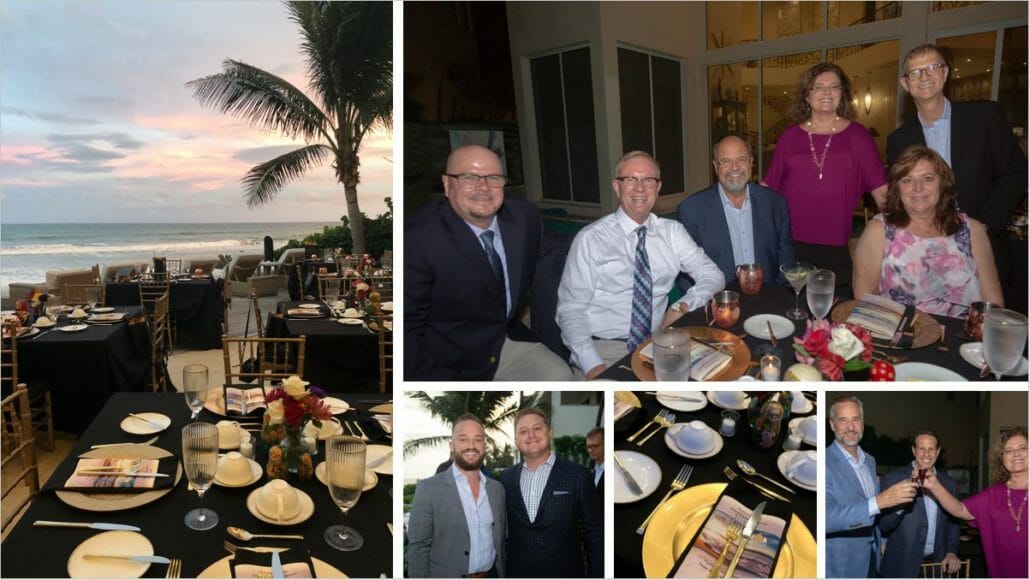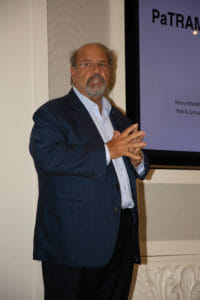In response to the newest CD from PaTRAM Institute™, “Blessed Art Thou among Women”, FanFareArchive.com interviewed our very own Katya Lukianov, Co-Founder and Artistic Director. FanFareArchive.com is a highly-respected online and hard-copy music magazine that specializes in reporting on classical music. They have published other interviews with PaTRAM™ personnel including Alexis Lukianov (Chairman), Vladimir Gorbik and Peter Jermihov (Conductors). FanFare has also published reviews of all PaTRAM™ CDs including our current one.
We urge you to read this excellent interview by James A. Altena, of FanFareArchive.com, published in their Nov/Dec 2020 (44:2) issue.
This interview is Copyright © 2020 by Fanfare Inc.
“It Is Truly Meet”: An Interview with PaTRAM’s Katherine Lukianov
BY JAMES A. ALTENA
Back in issue 42:3 (Jan/Feb 2019) I interviewed both Alexis Lukianov, the co-founder, chairman, and CEO of the PaTRAM (Patriarch Tikhon Russian American Music) Institute, and Russian conductor Vladimir Gorbik upon the release of the PaTRAM Institute Singers’ (hereafter PaIS) first CD, Teach Me Thy Statutes. That disc was nominated for a 2019 Grammy for Best Choral recording, and was selected “Record of the Year” for 2018 by MusicWeb International. That was followed in 43:2 by a joint interview with composer Kurt Sander and conductor Peter Jermihov upon the release of the premiere recording by the PaIS of Sander’s The Divine Liturgy of St. John Chrysostom, which earned a 2020 Grammy nomination for Best Choral Recording. Now, with the release of a third PaIS disc Blessed Art Thou Among Women, I have the privilege of interviewing Katherine (Katya) Lukianov, the Executive Director of the PaTRAM Academy, a program for training conductors and singers of Russian Orthodox liturgical repertoire.
Let me begin, as I did with your husband Alexis two years ago, by asking you to tell us something about yourself. You are not only a pianist and conductor, but also a mechanical engineer—a remarkable and interesting skill set combination. What aspects of your personal and professional background led to your deep involvement with the music of the Russian Orthodox Church?
First of all, thank you for your interest in PaTRAM. I grew up in a musical environment. My mother had a beautiful soprano voice and would perform in concerts, singing Russian folk songs accompanied by a 20-piece balalaika orchestra, in Michigan as well as adjoining states. She was also a conductor in our local Russian Orthodox church and I literally grew up in the choir loft. In retrospect, it is easy to see where my love for Russian Orthodox sacred music came from. I started playing piano at age seven and became a competitive pianist. I subsequently became a church conductor myself over 20 years ago. As for engineering, in middle school I developed a passion and proficiency in math and science, which ultimately led to me becoming a mechanical engineer and working at Boeing, bridging the design-to-manufacture of new airplane models. You are not the first person to comment on the dichotomy of music vs. science in my background. I have a deep passion for both. Engineering allowed me to develop my analytic mind. Interest in music, on the other hand, came from a deep love and passion in my heart for worship through beautiful and prayerful singing.
How did you and Alexis meet and become a couple? How do the two of you work together, both professionally and personally, in his business activities and in PaTRAM?
Alex and I met at age 13, in a Russian-American camp located in upstate New York. We were the best of friends for many years. It took a while for both of us to realize that perhaps it was a very good idea to marry your best friend! In terms of working together, Alex has several business ventures in the works. I do not work with him on business activities. PaTRAM is a different story. Alex handles the strategic side: future plans, determining concert and recording venues, organizing our choirs, event logistics, fundraising, etc. I work on the artistic side to develop themes and repertoire for our CDs. My focus is on the music. We both brainstorm the future of PaTRAM fairly regularly.
In the previous interview, Alexis gave us some basic background to the founding of PaTRAM, which I’d like for you to flesh out further. How did you first come to know about, and become acquainted with, Maestro Vladimir Gorbik, and consequently urge Alexis to meet with him in Russia in 2013? (Readers may be interested to know that I met Maestro Gorbik at orchestral concerts he conducted in New York in 2018 and 2019, and was also his guest for five days in Moscow in January 2019, during which he conducted and made a still to be released recording with his Russian orchestra.)
I had heard about Maestro Gorbik through respected friends involved with Russian Orthodox choral music. In 2013, Vlad Morosan (who runs Musica Russica) considered Maestro Gorbik to be the best current Russian Orthodox sacred choral conductor. My husband was planning a business trip to Moscow at the time and I began urging him to meet with Maestro. He originally resisted, asking me, “What on earth am I going to talk about with a maestro?” Although I did not have a preconceived plan, I felt very strongly that the meeting must take place and that something positive would come out of it. (Maestro Gorbik still refers to me as the heart of PaTRAM for this reason.) After my husband acquiesced, my dear friend Elizabeth Ledkovsky, who had contact with Maestro Gorbik, facilitated the meeting between him and my husband. The trip to Moscow was made during the beginning of Great Lent. For the Orthodox, this Lenten season has many unique services, with much of the associated music and text being of a deeply penitential nature. After attending a service and personally hearing the very prayerful singing at the Representation of the Holy Trinity-St. Sergius Lavra, where Maestro Gorbik conducts, my husband and he went out to dinner. That is how the concept of PaTRAM was born—a result of my husband’s brainstorm six-plus years ago!
Alexis mentioned that most of PaTRAM’s operations are funded by the Lukianov Family Foundation. Can you tell us something more about the Foundation, its purposes and activities?
The Lukianov Family Foundation was established for philanthropic purposes by my husband and me several years ago. Our foundation focuses primarily on two goals: supporting our church, and proliferation of the performing arts. In the case of PaTRAM, we achieve both goals by supporting the liturgical arts while helping to improve singing in our church and bringing greater attention to the beauty of Orthodox worship through music.
How did you come to shape PaTRAM’s educational programs? What were the obstacles and opportunities that presented themselves to you in the course of so doing that influence the various directions you have taken?
We began with a heavy focus on positively influencing the competency level of singers from parishes in the USA, which led to several successful singer programs at both OCA [Orthodox Church in America] and ROCOR [Russian Orthodox Church Outside of Russia] monasteries. We planned our events to coincide with meaningful events already taking place in the monasteries, which facilitated good attendance. In time, it became clear that it would be more impactful to also develop choir conductors, as opposed to just singers. This led to PaTRAM’s Conductor Master Classes and Academies. These classes and academies were developed with input from the three maestro conductors we work with—Vladimir Gorbik, Peter Jermihov, and Benedict Sheehan—and again were well-received programs.
Concurrently, we wanted to record music to showcase a very professional level of execution of prayerfully sung Russian Orthodox music. This led to our CDs, which struck a chord in the larger music community, with two Grammy nominations and critical acclaim. That was a very uplifting and humbling endorsement of our efforts!
I noted on PaTRAM’s website (patraminstitute.org) that, due to financial and logistical exigencies, the original online training courses offered directly by PaTRAM have been discontinued in favor of PaTRAM acting as a liaison to put students in contact with approved instructors for individualized one-on-one training. How has that shift worked out?
It was challenging to coordinate classes with a wide range of participants (Matushkas [wives of priests—Ed.], students, and singers who held other jobs) with different schedules and different needs. We also needed a minimum number in order to make the classes financially viable. As a result, we decided that the one-on-one training would be a better model (less expensive and with more direct revenue going to the teacher), and so we decided to facilitate the connection between student and teacher without being an intermediary.
Alexis also mentioned the use of Skype for conducting online courses. Have Zoom and other technologies been adopted as well, and if so, how are those being employed?
When we taught online classes with several students, we used an Adobe platform. With one-on-one lessons we leave the platform to the discretion of the teacher and student.
I likewise note that, regrettably but understandably, the annual in-person PaTRAM Institute Summer Academy at the ROCOR cathedral of St. Alexander Nevsky in Howell, NJ had to be cancelled due to the COVID-19 pandemic. What has been the impact of the pandemic and concomitant lockdown on PaTRAM, and also on the conduct of worship services and other activities at St. Alexander Nevsky?
We have been affected by the COVID pandemic in the same way as many others. In-person events have been cancelled to support the health and safety of all involved. We continue to keep a close eye on the pandemic level while still continuing to plan future events. We had planned to record our new CD of Rachmaninoff’s Vigil, sung by a large male choir, in Moscow this year but had to delay it until 2021.
The impact on St. Alexander Nevsky at the height of the lockdown was significant, as it was on many churches. Most services were performed by a skeleton crew, with those services being livestreamed. Personally, I felt the biggest negative effect was the limited attendance during the Great Lent season, which is a critical and spiritually edifying part of the annual church cycle. As mentioned previously, Great Lent is a time of great penitence, with fasting from certain foods, and increased prayer and church attendance, in preparation for the joyous resurrection of Jesus Christ on Pascha Sunday. I greatly missed the benefit of in-person church services this year due to COVID. Of course, this impacted our church (as well as all others) financially as well, which has presented its own challenges for more fundraising.
How would you describe your specific activities with the PaTRAM Institute? What—if indeed there is such a thing—is a typical workday like for you?
There are various projects I am working on from the musical side, from recordings to concerts to tours. I work on PaTRAM part-time, and my hours greatly vary with the projects at hand, which now also entail converting a local orthodox choir in Pompano Beach, FL to a professional level under the auspices of PaTRAM support. I largely work remotely anywhere from several hours per day to marathon days as the need demands.
As a teacher, what do you consider to be the most important information, techniques, and values that you attempt to communicate to your students, and what are your chief pedagogical methods for so doing?
Personally, I rarely teach, other than to develop my own choir now at St. Luke’s Orthodox Church. My job is to establish standards for what we strive to relay in every educational endeavor, which is how to accomplish prayerful singing. Overall, this involves tone quality, diction, and singing together as an ensemble, with good and appropriate dynamics.
We offer musicianship as well as singing techniques to our students during our classes. This is critical to helping to move the students forward. The additional specific elements we do teach are established by coordination between myself, the faculty, and the conductors, based on common gaps they encounter in their work with many various singers and choirs. I am happy to say, we have been blessed to have outstanding faculty at all of our events—true experts in Orthodox sacred choral music and singing!
Since PaTRAM is still a fairly young operation, this next question may be a bit premature, but I’ll ask it anyway. What concrete impact has PaTRAM had to date in its stated goal of elevating the quality of choir singing in Russian Orthodox parishes in the USA? Do you have any sort of objective metrics for assessing that impact beyond the testimony of parish choir directors, clergy, and parishioners around the country?
I would say that up to this point we have relied on the testimony of participants in our programs. We polished the questions in our feedback questionnaire to identify the pros and cons of our programs, and adjusted them accordingly. Most of the feedback has been very positive.
We recently sponsored a young conductor to receive a series of conducting lessons with Benedict Sheehan. PaTRAM will be showcasing his very positive experience online in the near future. In addition, I have taken on conducting the choir at our local parish. We plan to also document the tangible progress in this process.
My next question may be counterintuitive, but again I’ll ask it. Have you folks ever run into any opposition to your training efforts—e.g., insistence that standards of choir singing in a particular parish are already good enough, or that your program has the effect of excluding from choirs enthusiastic and devout parishioners who can’t meet your standards? If so, how do you work with such situations?
As is to be expected, we have found various reactions to our training efforts. Some parishes already offer basic training, so they strive to implement their own programs to meet their own standards. Some attend other programs, such as the Synodal School of Liturgical Music, held at the Holy Trinity Monastery in Jordanville, NY. But those who have chosen to attend our programs have gone so far as to say it was the best experience they have ever had!
Concerning the second part of your question, the interesting thing about Maestro Gorbik is that he started his choir with approximately 75 percent non-professional singers. Over time he brought them up to a professional level. So, teaching singers how to sing prayerfully at a high level is the foundation of PaTRAM.
Let’s turn attention to the PaTRAM Institute Singers’ new release, Blessed Art Thou Among Women, devoted to hymnody and service music glorifying the Theotokos (literally, “God-Bearer”), the Virgin Mary. Why was this focus chosen, as opposed to one on, say, the Trinity, or the Incarnation or Resurrection of Christ?
One of my favorite feasts is the Dormition of the Mother of God. Also, as a mother, I ask the Virgin Mary to pray for me to be a better wife and mother, and to watch over my children with her prayers. In fact, I once had a miraculous answer to one of my petitions to her. So, it was very easy to gravitate towards using the Theotokos as a theme for our CD due to my love for her.
How would you explain the role that veneration of the Theotokos plays in Orthodox worship and devotions, especially in liturgical music? How is that distinct from its Roman Catholic counterpart?
I would say that the liturgical emphasis on the Theotokos is much greater than I have seen in my limited exposure to Catholicism. The Theotokos, or Mother of God, plays a very important role in the Orthodox faith and is venerated in song during every liturgy and several times throughout the course of all vigils. As a result of her prominent role in Orthodoxy, there is a huge and diversified repertoire of Russian Orthodox chants and music written to honor her. In fact, our entire church calendar starts and ends around two of her major feasts—The Nativity of the Theotokos in September and her Dormition in August (the annual Church calendar begins on September 1).
There are also multiple representations of her in icons, often relating to her motherhood portrayed tenderly embracing her Son, so Orthodox mothers in particular are often drawn to venerating her, that is to asking for her intercessory prayers. One of the very popular hymns on our recent CD, We Have No Other Hope Than Thee, underscores how important the Theotokos is as an intercessor for the Russian people.
What were your criteria for selecting the particular works featured on this recording, out of a great many settings that might have been chosen?
Naturally, there are various levels of complexity in music written for church services. Some pieces are simpler (but still beautiful) chants. Others are complex musical works. For this CD, a variety of pieces was chosen to showcase the different styles of Russian Orthodox music that developed over many years, incorporating composers ranging from the late 1600s to the 20th century. Some of the pieces are commonly used in liturgical services, some have rarely been heard, others are considered concert pieces and are not typically sung in church services. A few of the pieces are the same prayers, set to music by different composers who lived at different times. We wanted to bring the depth and beauty of varying musical styles within Russian Orthodoxy to the listener’s awareness.
Have you ever had an occasion where a choir member was not responsive (for whatever reason) to a particular selection? If so, how have you addressed and resolved that issue?
Perhaps we have been blessed, but no, I have not encountered this. Of course, everyone has a personal taste in music, but when the choir comes together, we all know we have a common mission, and everyone strives to execute to his or her peak ability.
How has your work dovetailed with that of Peter Jermihov, the conductor in this recording? Have you and he ever found that each of you wanted something different in some aspect of the choir’s singing, and if so how has that been worked out?
I have the utmost respect for Maestro Peter Jermihov as a maestro and musician. He feels the music deep in his soul, and conducts with such talent and expertise! On the occasions when we have had differing opinions, we have always worked through them to find a meaningful compromise.
Another—hopefully temporary—casualty of the COVID-19 pandemic is postponement from 2020 to 2021 of a planned concert tour and associated recording by the PaIS featuring that summit of Russian Orthodox sacred music, the All-Night Vigil (Vespers) of Rachmaninoff. While I look forward to all this eagerly, the question inevitably arises: Given that there are already a plethora of fine recordings of this work, including the highly acclaimed recent one by Peter Jermihov with Gloriae Cantores Dei, what unique contribution does PaTRAM hope to offer here that justifies adding yet another version to the catalog?
I agree with the high acclaim for Jermihov’s recording with Gloriae Cantores Dei. In fact, my husband and I were part of the PaTRAM choir for that recording and PaTRAM was one of the sponsors of the recording.
We will record Rachmaninoff’s Vigil with an all-male choir, which is a unique contribution in and of itself, with somewhat unique arrangements. This masterpiece will be conducted by Maestro Gorbik, who himself is Russian and steeped in Russian choral music. He did such a beautiful job on our first CD, Teach Me Thy Statutes, which was nominated for a Grammy. We are confident that he and the choir, which we expect to be over 50 voices strong, will do a stellar job once again.
Another PaTRAM event, still listed for February 2021, is the world premiere in Moscow of Russian Cross with acclaimed Russian stage and film star Yevgeni Mironov. What more can you tell us about this planned event?
We are in the middle of planning an international concert in Moscow on February 8, 2021. This will be a joint production and world premiere of Russki Krest (Russian Cross) with critically acclaimed movie star Yevgeni Mironov of Russia. This concert will consist of Mr. Mironov reading the poem “Russki Krest,” written by Nikolai Melnikov, with our PaTRAM choir singing interspersed hymns that support the poem. It’s a very deep and moving work. We will perform at Zaradiye, a brand-new, state-of-the-art hall, that is just outside of the Kremlin. All proceeds from the concert will go to support Life in Motion, a not-for-profit organization that provides prosthetic limbs to Russian children.
This leads me to reprise a question I asked in my interview with Alexis. Have increased political tensions between the USA and Russia (in addition to the worldwide COVID-19 pandemic) created obstacles for the realization of this project, such as difficulty in obtaining visas?
We have never had difficulties obtaining visas for our singers and staff in the past. No one has ever been denied entry into Russia. However, due to the pandemic, the Russian Consulate has been closed for months. Therefore, visa applications are not being accepted, and visas are not being granted. It remains unclear when the Russian Consulate will open and begin accepting visa applications once again.
What other plans do you and PaTRAM have on the drawing board, once the pandemic finally passes?
Besides planning to record the CD of Rachmaninoff’s All-Night Vigil with our male choir and the Russki Krest world premiere, we are also planning a series of concerts and singing of orthodox services in 2021. These will likely take place in Serbia as well as in Romania and Bulgaria in mid-2021. Additionally, we are cultivating our plans in 2022 and 2023 for additional recordings and concert tours.
What do you see the focus of PaTRAM being in the next few years?
As mentioned, we have stepped back from providing online education, but will continue to help to facilitate it. There are many other organizations that offer similar educational programs, and we would rather channel our resources into concerts and professional development to help proliferate the beauty of Russian Orthodox music.
We are planning an album dedicated to the music of Archimandrite Matfei (1938–2009), an hieromonk and legendary choirmaster from Holy Trinity-St. Sergius Lavra Monastery, who is credited with maintaining Russian choral traditions from pre-revolutionary times through decades of persecution to the present day. That liturgical tradition has had a large impact on Orthodox music and is now widespread throughout Russia and the rest of the world. We hope to record at the Dormition Cathedral at the Lavra—the same place where Fr. Matfei conducted and worshipped.
Another highly influential component in the development of Russian Orthodox liturgical music was the Moscow Synodal School. Before the 1917 Revolution it was the musical nucleus, but was dissolved in 1919 by the atheistic government. Many of the faculty were then merged into the Moscow Conservatory, but the proliferation of Synodal music by its many illustrious composers was over. Many of these directors and faculty members were very accomplished composers like Kastalsky and Viktor Kalinnikov. From this school came many renowned students and alumni such as Rachmaninoff, Grechaninov, Shvedov, etc. It would be appropriate to honor all of them with a compilation of their works.
So, you see, there is still much more work to be done by the PaTRAM Institute to propagate Russian Orthodox music, performed at the highest levels without a hint of accent, in a prayerful manner in unique church venues, to the glory of God!
BLESSED ART THOU AMONG WOMEN • Peter Jermihov, cond; Fotina Naumenko1,5, Alexandra Olsavsky6 (sop); Lauren McAllister6 (mez); Pavel Murashka7, Daniel Shirley6, Sergei Tkachenko7 (ten); Leonid Roschko2,7 (bar); Michael Hawes6 (bbar); Alexis Lukianov3,7, Glenn Miller4 (basso profundo); PaTRAM Institute Singers • REFERENCE 737 (79:11 Text and Translation)
BORTNIANSKY Today the Virgin Gives Birth. Beneath Thy Compassion. KASTALSKY Today the Virgin Gives Birth. Rejoice, O Queen. TITOV O Virgin Unwedded. SVIRIDOV 1A Hymn of Praise to the Mother of God. P. CHESNOKOV 2O Most Holy Theotokos, Save Us. 3Memory Eternal. ZHELUDKOV 4Do Not Lament Me, O Mother. RACHMANINOFF The Theotokos, Who Is Ever-Vigilant in Prayer. VIKTOR KALINNIKOV Virgin Theotokos, Rejoice. N. TCHEREPNIN Virgin Theotokos, Rejoice. It Is Truly Meet. GRETCHANINOV It Is Truly Meet. DANILIN All of Creation Rejoices in Thee. A. CHESNOKOV Do Not Lament Me, O Mother. LEDKOVSKY 5The Angel Cried Out. ILYASHENKO The Mystery of God from All Eternity. LVOVSKY O Ye Apostles, Assembled Here. MATVEYEV 6Magnification for the Icon “Joy of All the Sorrowful.” TOLSTIAKOV With the Voice of the Archangel. To Thee, the Victorious Leader. NIKOLSKY To Thee, the Victorious Leader. ANONYMOUS 7In the Flesh Thou Didst Fall Asleep
This interview is Copyright © 2020 by Fanfare Inc.
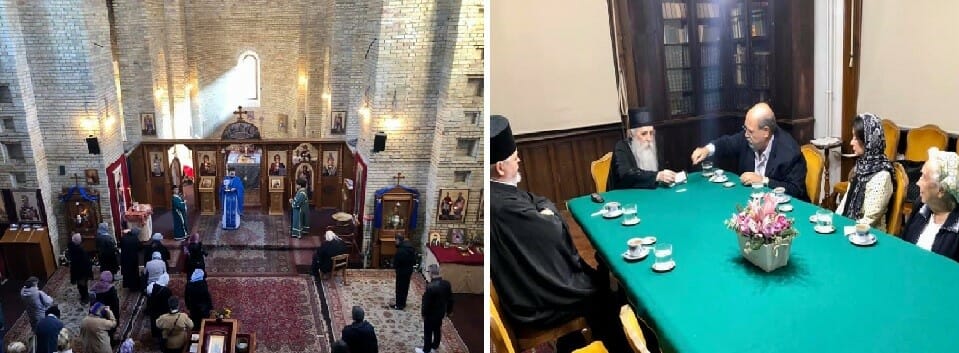
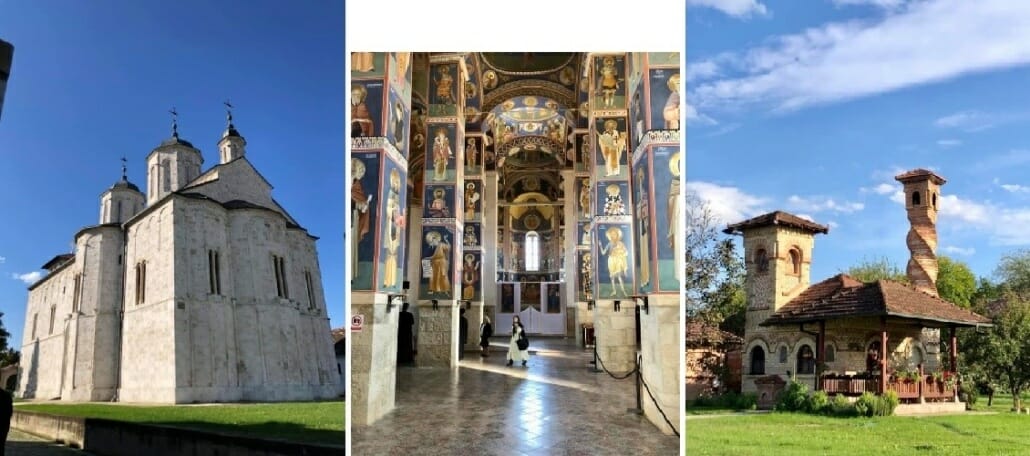
![]()
